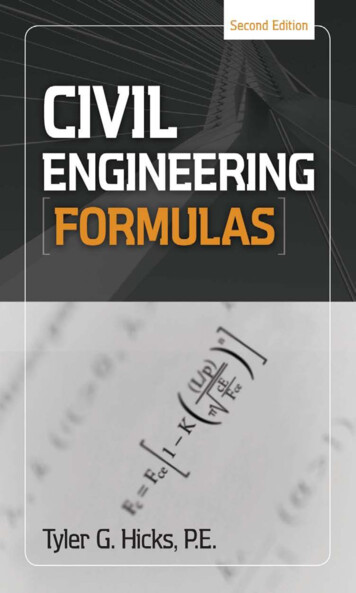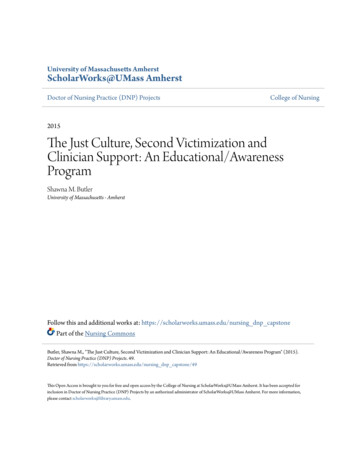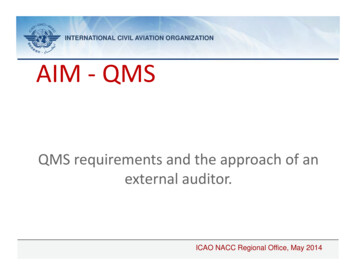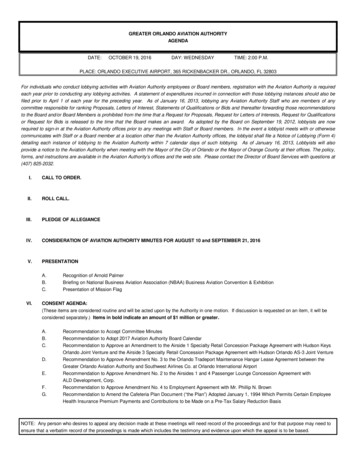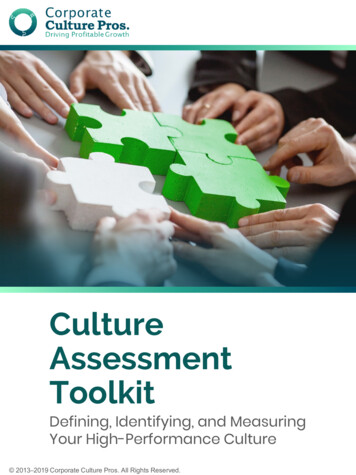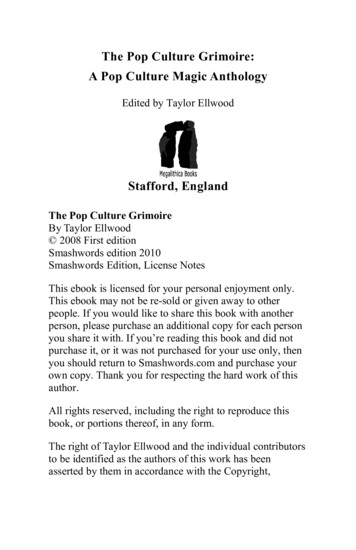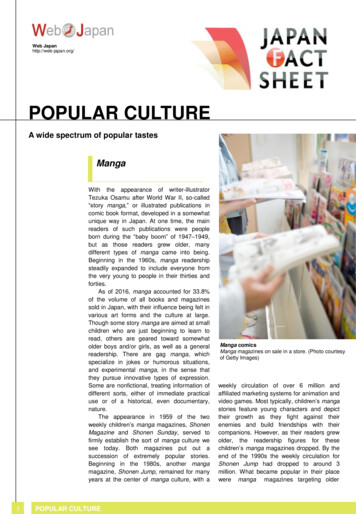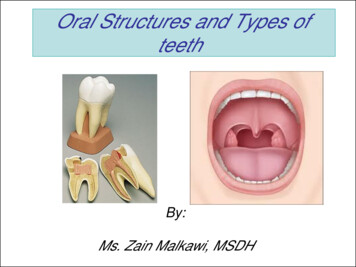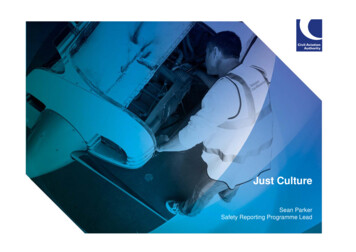
Transcription
Just CultureSean ParkerSafety Reporting Programme Lead1
EC Regulation 376/2014 on the Reporting,Analysis and Follow Upof Occurrences in Civil AviationEntry into Force May 2014Applicable from 15 Nov 20152
Occurrence Reporting Legislation in the EUEC Directive 2003/42 EC Regulation 376/2014 The Directive and corresponding national legislation onlyidentified individuals who should report occurrences; pilots,engineers, ATCO etc. The role organisations play in enabling reporting and using theinformation to improve safety is not reflected in the Directive The Regulation now defines organisational responsibilities inline with Safety Management System principles3
EC Directive 2003/42 EC Regulation 376/2014Supporting Safety Culture good practice Reports were not always utilised by organisations to identify safetyinterventions Requirements for organisations to analyse and follow-up reportsnow included Organisations also now need to provide employees withinformation concerning the analysis and follow-up of occurrencesFeedback!4
What’s ‘Mandatory?’ Implementing Regulation 2015/1018 defines occurrencesconsidered as ‘Mandatory’; divided into 5 annexes for clarity: Annex I – Operation of the aircraftAnnex II – Technical conditions, maintenance and repairAnnex III – Air navigation services and facilitiesAnnex IV – Aerodromes and ground servicesAnnex V – Aircraft other than complex motor powered aircraftincluding sailplanes and lighter than air vehiclesDon’t forget ‘Voluntary’ reports5
EC Directive 2003/42 EC Regulation 376/2014Definition of Just Culture introducedA culture in which front-line operators or other personsare not punished for actions, omissions or decisionstaken by them that are commensurate with theirexperience and training, but in which grossnegligence, wilful violations and destructive acts arenot tolerated6
What is a Just Culture?Cultivating an atmospherewhere people haveconfidence to report safetyconcerns without fear ofblame. Employees mustknow that confidentiality willbe maintained andthat the information theyReportingsubmit will be actedupon, otherwise they willdecide that there is nobenefit in their reporting.Errors and unsafe acts will notbe punished if the error wasunintentional. However, thosewho act recklessly or takedeliberate and unjustifiablerisks will still be subject todisciplinary action.InformedOrganisation collects andanalyses relevant data, and activelydisseminates safety information.LearningSafety CultureJustOrganisation is able tolearn from its mistakesand make changes. Itwill also ensure thatpeople understand theSMS processes at apersonal level.FlexibleOrganisation and the people init are capable of adaptingeffectively to changing demands.7
Not entirelya new ideaA fault revealedvoluntarily will betreated leniently buta fault concealed maylead to seriousconsequences for theworkman, not tomention the pilotHurricane production19408
EC Directive 2003/42 EC Regulation 376/2014Organisations must implement a just cultureEach organisation established in a Member State shall,after consulting its staff representatives, adopt internalrules describing how ‘just culture’ principles areguaranteed and implemented within that organisation.Employees and contracted personnel may report to theMember State alleged infringements of these rules.Whistleblowing!9
EC Directive 2003/42 EC Regulation 376/2014National databases only contain initial reports, few updates The majority of occurrence reports were not updated after thereporting organisation had investigated Initial reports have to be submitted within 72 hours so areusually very brief resulting in poor quality data if not updated Where an actual or potential safety risk is identified by thereporting organisation they must follow up within 30 days tothe NAA If the 30 day update has not closed the occurrence the finalanalysis should be provided within 3 months – in principle10
How many updates to the ortWithin 30daysInvestigate& hrsInvestigate& analyseOccurrenceReportWithin 30daysInvestigate& analyseOccurrenceReportWithin 3monthsClosed311
National databases only contain initialreports, very few updates To enable efficient information exchange reports sent to the CAAshould be compatible with ECCAIRS, either by: The organisation’s database being capable of producing anappropriate ECCAIRS format report. using the CAA online system See IN-2015/117safety.performance@caa.co.uk.12
Just Culture should enable open reportingleading to learning and improvementQuestions?13
of Occurrences in Civil Aviation Entry into Force May 2014 Applicable from 15 Nov 2015. 3 Occurrence Reporting Legislation in the EU EC Directive 2003/42 EC Regulation 376/2014 The Directive and corresponding national legislation only identified individuals who should report occurrences; pilots, engineers, ATCO etc. The role organisations play in enabling reporting and using the information to .
